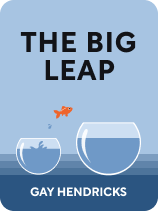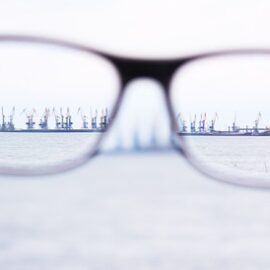

This article is an excerpt from the Shortform book guide to "The Big Leap" by Gay Hendricks. Shortform has the world's best summaries and analyses of books you should be reading.
Like this article? Sign up for a free trial here .
Are you looking for The Big Leap quotes by Gay Hendricks? What are some of the most noteworthy passages worth revisiting?
In The Big Leap, Hendricks asserts that, while we all have an innate call toward our most successful and fulfilling life, even highly successful people are often plagued by an inability to achieve beyond a certain self-imposed limit. This is because of the “happiness threshold”—the maximum amount of happiness you’re comfortable with.
Below is a selection of quotes with explanations.
The Big Leap: Conquer Your Hidden Fear and Take Life to the Next Level
The Big Leap, by psychologist and personal growth coach Gay Hendricks, aims to help you overcome the psychological barriers to success and fulfillment. Hendricks asserts that, while we all have an innate call toward our most successful and fulfilling life, even highly successful people are often unable to achieve beyond a self-imposed limit, a “happiness threshold.” As you achieve greater success, Hendricks says you reach this threshold, which triggers self-sabotaging behaviors.
Hendricks explains how our happiness thresholds are established early in life, through the adoption of false beliefs, and how to identify your own false beliefs. He offers practical advice for applying this new knowledge to your life and relationships, in order to take the “big leap” into living your best life.
The following The Big Leap quotes highlight some of his key ideas.
“Each of us has an inner thermostat setting that determines how much love, success, and creativity we allow ourselves to enjoy. When we exceed our inner thermostat setting, we will often do something to sabotage ourselves, causing us to drop back into the old, familiar zone where we feel secure.”
Hendricks calls this inner thermostat setting the “Upper Limit Problem”—an internal threshold for the maximum degree of success and happiness you’ll allow yourself to experience. According to Gay Hendricks, when we achieve high degrees of success in our careers, relationships, and other areas of life, we’ll begin to feel discomfort as we near that threshold, and this triggers self-sabotaging behaviors. This threshold works to prevent you from reaching what he calls your “Zone of Genius.”
“I expand in abundance, success, and love every day, as I inspire those around me to do the same.”
Hendricks has formulated this mantra specifically designed for combatting the false beliefs and limiting behaviors discussed in The Big Leap. It serves to open your mind to accepting all of the abundance of life in your state of fulfillment. He calls this the Universal Success Mantra, or USM.
Repeat the mantra in sequence with your breath in meditation daily. Notice any resistance your mind has to the mantra. It’s natural—just notice it and go back to the mantra. It will take practice to retrain your mind; you’re deprogramming from a lifetime of embedded false beliefs. In addition to setting aside time to focus on your mantra in meditation, occasionally just repeat it as you go about your day any time you think of it. Hendricks also suggests that you may want to write the mantra down on pieces of paper and put them where you’ll see them throughout the day, for example in your house, car, or office, in order to prompt yourself to repeat it regularly.
“Criticism and blame are addictions. They are costly addictions, because they are the number-one destroyer of intimacy in close relationships.”
According to Hendricks, criticism is usually as much, or more, about you as it is about the other person. It keeps you from being able to work harmoniously with others, and puts the blame for failures or problems onto others instead of taking responsibility for those yourself.
Hendricks gives some tips on how to stop criticizing others: Once you take notice of your tendency toward criticism, Hendricks suggests trying to refrain entirely from making any critical statements for one day—this should make you aware of how habitual the behavior is. Then, notice whether your criticisms are things you can do something about, and if so, just do what it takes to resolve it. He predicts, however, that you’ll notice that most of your criticisms are not productive, and when you realize this, you’ll become aware of how unnecessary they are and eventually stop the habit.

———End of Preview———
Like what you just read? Read the rest of the world's best book summary and analysis of Gay Hendricks's "The Big Leap" at Shortform .
Here's what you'll find in our full The Big Leap summary :
- How to overcome the psychological barriers to success and fulfillment
- Why most people have a self-imposed limit to happiness
- How to identify your own false beliefs and stop self-sabotaging






